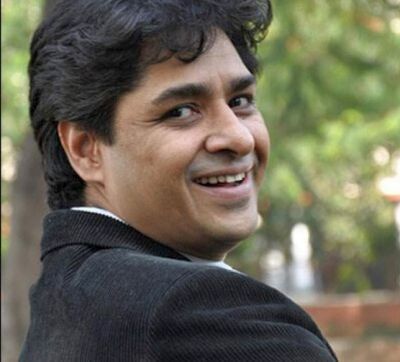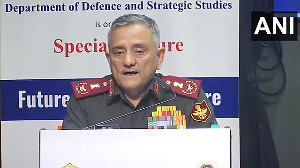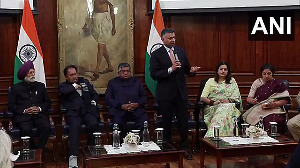 The Delhi high court on Friday acquitted former TV anchor and producer Suhaib Ilyasi of the charge of killing his wife 18 years ago, saying the prosecution's case of murder was not established.
The Delhi high court on Friday acquitted former TV anchor and producer Suhaib Ilyasi of the charge of killing his wife 18 years ago, saying the prosecution's case of murder was not established.
A bench of justices S Muralidhar and Vinod Goel allowed the appeal of 52-year-old Ilyasi challenging his conviction and life imprisonment awarded by the trial court in December last year.
The bench held there was nothing to suggest that Ilyasi deliberately delayed medical assistance for his wife Anju, who was first taken to a private hospital and then to the AIIMS where she was declared dead.
The incident took place on the intervening night of January 10-11, 2000 when Anju was rushed to a hospital with stab wounds she received at her East Delhi residence.
The trial court had on December 20, 2017 sentenced Ilyasi, who had shot into limelight after hosting TV crime show -- India's Most Wanted -- to life term for stabbing his wife to death, saying he ‘committed murder and gave it a colour of suicide’.
The bench set aside the trial court's verdict and said the prosecution has failed to prove his guilt for the offence of murder and that he be released forthwith unless wanted in some other case.
It said merely because the victim was found to be in good spirits around two hours prior to the incident, it would not rule out the possibility of her committing suicide by stabbing herself as a result of her quarrel with her husband.
"The precise circumstances that led to the said decision of the deceased might be difficult to explain but surmises and conjectures cannot substitute proof," it said.
Ilyasi's daughter Aaliya, who was present at the time of pronouncement of the verdict, expressed happiness over the decision and said she always had trust in her father.
"I am very very happy. I am not able to express myself much right now. For all this while, we were silent about it because the judgment was yet to come. We have suffered a lot but I trust my father completely and I had always trusted him," she said.
At the beginning of the judgement, the bench posed the question, "Did the appellant murder his wife or was it a case of suicide?"
The bench said the trial court had held that Ilyasi had indeed murdered the victim. "We, however, think not," it said.
The bench, in its 112-page verdict, said one of the key links in the chain of circumstances, that is the death was homicidal, has not been proved by the prosecution.
It said the evidence of Ilyasi's PSO, who was the first one to enter the scene soon after the incident had taken place, made it clear Ilyasi had opened the door, called him inside and asked to help in lifting the victim.
The bench said the unchallenged testimony of the PSO, who was with Delhi Police, that Anju had told him she committed a mistake contradicts the prosecution theory that Ilyasi murdered his wife.
"Even if the statement of PSO in his further cross-examination by Ilyasi that the deceased was asking the appellant to save her life is kept out of the reckoning, Anju saying that she had committed a mistake supported the theory of suicide. What comes across is that the deceased regretted her impulsive reaction in stabbing herself," it said.
It also noted that soon after the death of his wife, Ilyasi was found uncontrollably weeping by her father and the testimonies of Anju's brother and father suggest that the couple were deeply in love.
The bench said the report of the five-member medical board contained no specific reasons for the conclusion that the preponderance of evidence in this case points towards ‘commission of homicide’.
"In view of the evidence of the medical professionals who comprised the first medical board and in light of the medical literature, this court rejects the plea of the prosecution that the medical evidence unmistakably and conclusively proves that the death was homicidal," it said.
The bench said the forensic evidence had also failed to establish that the death was homicidal as the chance prints lifted from the crime scene did not match with any of the specimen prints of Ilyasi.
"The forensic evidence does not link the accused to the killing of the deceased in the manner suggested by the prosecution. The motive for the crime too has not been established," it said.
Regarding the testimony of Anju's sister Rashmi Singh, the court said it appeared that she may have had an interest in securing the conviction of Ilyasi and her testimony as an interested witness does not satisfy the test of truthfulness.
Ilyasi, in his appeal through advocate Rajiv Mohan, has claimed that the police had not collected any material for three months after the incident and there was no evidence to charge him for the offence of murder.
The trial court had also imposed a fine of Rs 2 lakh on him and directed that Rs 10 lakh be paid as compensation to Anju's parents.
Earlier, Ilyasi was charged with milder provisions, including 304 B (dowry death) of the Indian Penal Code.
However, Anju's mother Rukma Singh and sister Rashmi Singh had moved the Delhi high court which in August 2014 ruled that the former TV producer would be tried under Section 302 of the IPC for the offence of murder.
Ilyasi was arrested on March 28, 2000. Charges were framed against him in the case after his sister-in-law and mother-in-law alleged that he used to torture Anju for dowry.










